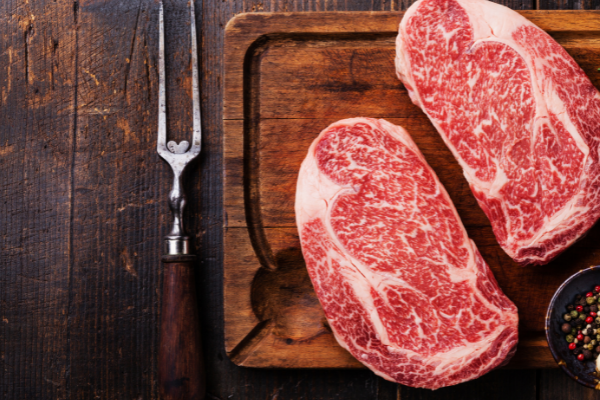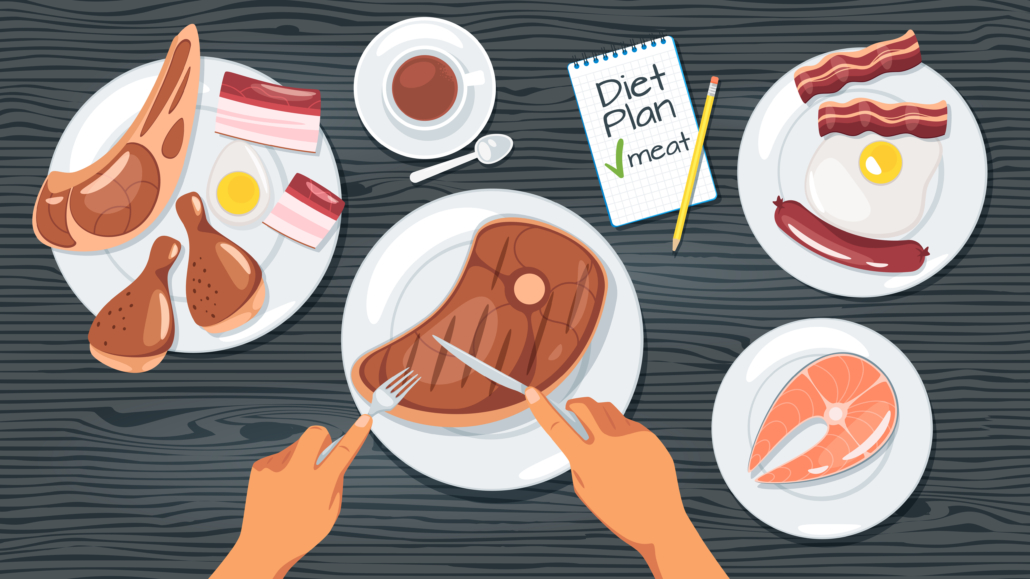We include products in articles we think are useful for our readers. If you buy products or services through links on our website, we may earn a small commission.
Carnivore Diet Ketosis: What You Need to Know
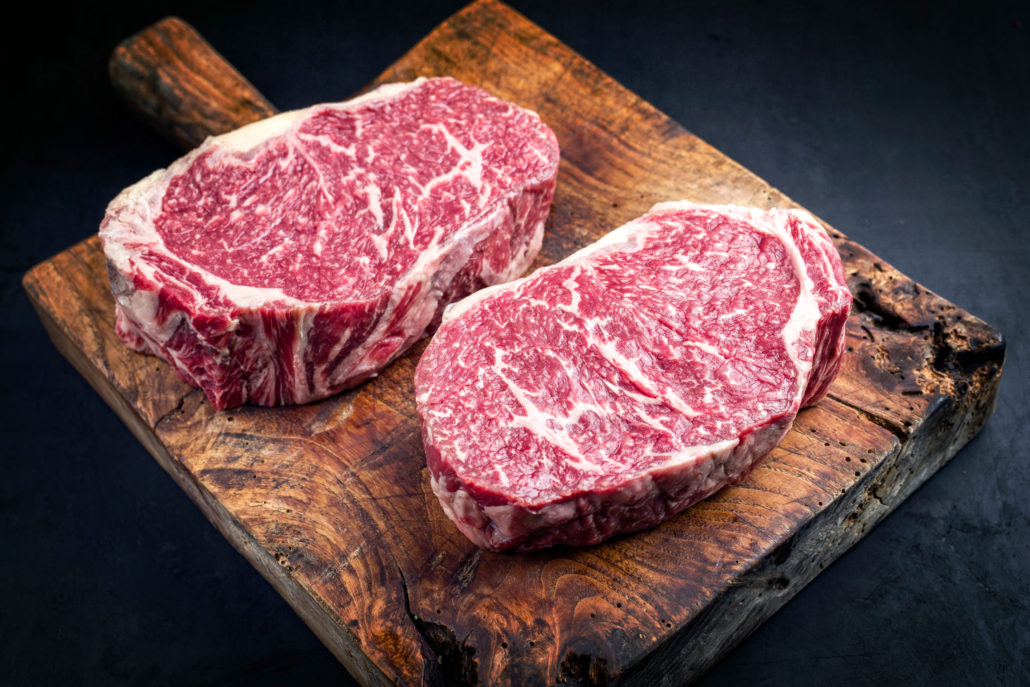
One of the key mechanisms through which the carnivore diet produces its effects is ketosis. In this metabolic state, the body produces the majority of its energy needs from the breakdown of dietary and body fat. This process produces powerful energy molecules called ketones. The transition to ketosis is a hallmark of all “ketogenic” low-carbohydrate diets. But the carnivore diet takes carb restriction to another level, by virtually eliminating all carbohydrates.
Understanding how the carnivore diet induces ketosis, its potential health benefits and the limits on protein intake can be valuable for those considering this dietary approach.
Table of Contents
What is the Carnivore Diet
The carnivore diet is based on a large body of research that suggests that humans evolved as hyper-carnivorous apex predators feasting on giant, extremely fatty animals known as megafauna for nearly two million years.5
It wasn’t until the dawn of the agricultural revolution around 10,000 years ago that we began to settle down and cultivate grain crops. This change was in large part caused by the effectiveness of human hunting, which led to the extinction of the megafauna humans had relied on.[1] [2]
10,000 years is just a flash in the pan of our dietary evolution. Our bodies are designed over millions of years to thrive on fatty meats. Our species-specific preference for fatty meat is manifest in the fact that we are metabolically constrained to get a maximum of 35-50% of our calories from protein. More than that and we get “protein poisoning.” 4
Since the carnivore diet is essentially zero-carb, the remaining 65% of our calories after protein have to come from animal fats!
What is Ketosis?
Ketosis is an energy production process where the body gets the majority of its energy from breaking down fatty acids from the foods we eat, and/or from fat stored on our bodies.1
The process of ketosis is as follows:
- Carbohydrate restriction: Reducing carbs to less than 20% of your caloric intake depletes glucose stored in your muscles. This occurs on all low-carb diets such as Atkins, paleo-keto, standard keto, meat and greens, and of course, the carnivore diet.
- Decreased levels of insulin: When carb intake drops, so do insulin levels. Less insulin triggers the body to metabolize fatty acids and transport them to the liver.
- Ketone production: In the liver, fatty acids are broken down through a process called beta-oxidation into a compound called acetyl-CoA. The liver then converts acetyl-CoA into ketone bodies: acetoacetate, beta-hydroxybutyrate (BHB), and acetone.
These ketone bodies provide significantly more energy than glucose molecules.
| Glucose (Carb) Energy | 3-Hydroxybutyrate Ketone (Fat) |
| 8.7 kg of ATP per 100g | 10.5 kg ATP per 100g |
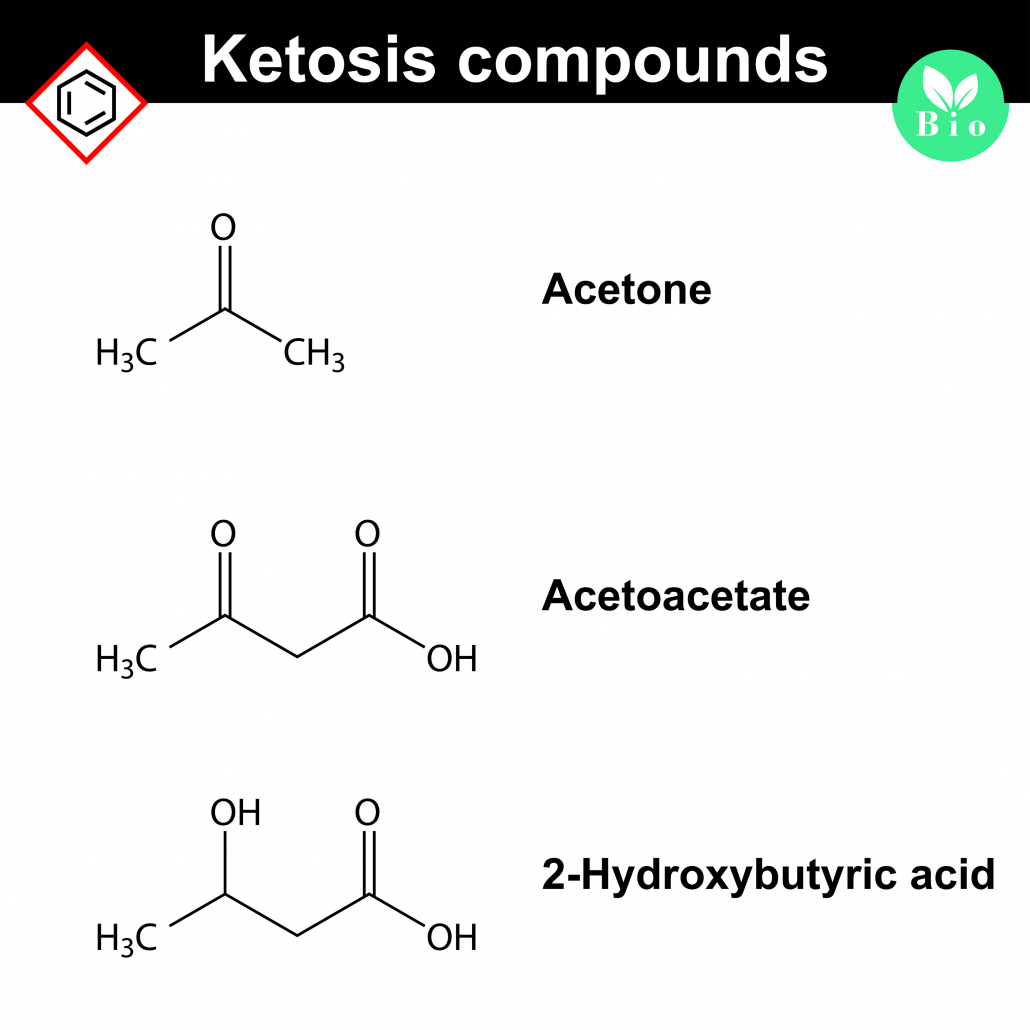
What percent of the body’s energy comes from ketones on the carnivore diet?
Since the carnivore diet is essentially zero carb, a significant portion of the body’s energy comes from ketones, especially for the brain.
However, the exact percentage will vary depending on how adapted a person is to a low-carb high-fat diet, their level of physical activity, and baseline metabolic rate.
Up to 75% of the brain’s energy needs can be met by ketones from ketosis.
For the rest of the body’s energy needs, the exact percentage can vary. A reasonable estimate is from 50-70% of energy from ketones. The remainder would come from fatty acids and glucose derived from gluconeogenesis.
Are People on the Carnivore Diet Always in Ketosis?
Most people who have adapted to the carnivore diet will be in mild ketosis. For many people, ketosis– tested as elevated ketone levels in the urine– is not detectable.
The only clinical study assessing how the carnivore diet impacted ketone levels in the blood was published in 1930. It was done at New York’s Bellvue Hospital and followed three men. Two of the men ate only meat for a year, and the third man did carnivore for only ten days.
One of the study’s participants, the Arctic explorer Vilhjalmur Stefansson, proposed the idea. Steffanson first discovered the possibility and benefits of the carnivore diet while living with the Inuit.
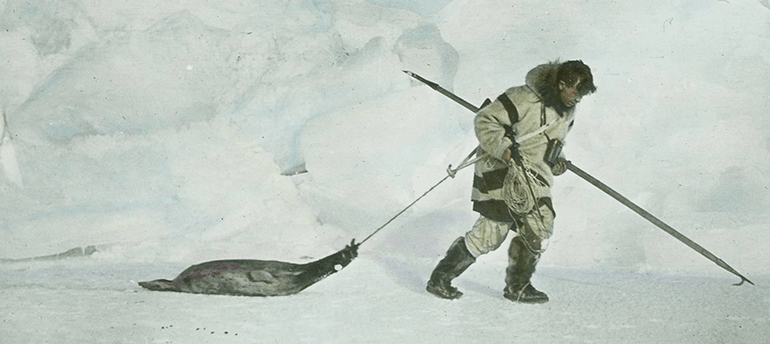
Vilhjalmur Stefansson dragging a seal back to camp. This picture was the cover photo for Stefansson’s book, “The Friendly Arctic,” published in 1921.
Ultimately, the researchers found that ketone bodies in the urine decreased after the commencement of the diet, even as the fat-to-glucose/protein ratios remained consistent.1
Here’s a summary of the main findings of the study in the words of the researchers:
Diet and Duration: Two men lived on an exclusive meat diet for one year, and a third man followed the same diet for 10 days. The proportion of lean to fat meat consumed was based on the individuals’ instinctive choices.
Nutrient Intake: “The protein content of their diet ranged from 100 to 140 grams, fat from 200 to 300 grams, and carbohydrates (derived entirely from the meat) from 7 to 12 grams. Their total caloric intake varied from 2000 to 3100 calories.”
Physical and Mental Health: At the end of the year, the subjects were mentally alert, physically active, and exhibited no specific physical changes in any body system.
Weight Changes: During the first week, all three men lost weight due to a shift in the body’s water content as it adjusted to the low carbohydrate diet. After this period, their weights remained stable.
Blood Pressure: Throughout the prolonged test, one man’s blood pressure remained constant, while the systolic pressure of the other decreased by 20 mm, with diastolic pressure remaining uniform.
Bowel Function: The control of bowel movements was not disrupted while the subjects were on the prescribed meat diet. However, one subject developed diarrhea when the proportion of protein calories in the diet exceeded 40 percent.
Vitamin Status: No vitamin deficiencies were observed.
Urine Acidity: The total acidity of the urine increased to 2 or 3 times that of the acidity on mixed diets, and acetone was present throughout the periods of exclusive meat consumption.
Kidney Function: Urine examinations, assessments of the nitrogenous constituents of the blood, and kidney function tests showed no evidence of kidney damage.
Metabolism: While on the meat diet, the men metabolized foodstuffs with fat-to-protein ratios between 1.9 and 3.0, and excreted between 0.4 to 7.2 grams of acetone bodies per day.
Overall Health: In these trained subjects, clinical observations and laboratory studies provided no evidence that any adverse effects had resulted from the prolonged use of the exclusive meat diet.
Note that the only instance when a participant experienced discomfort including diarrhea was when as an experiment they ate only lean protein. This ws quickly remedied by a single high-fat meal.
How Much Fat do I Need to Eat to Stay in Ketosis on the Carnivore Diet?
The exact amount of fat needed to maintain ketosis can vary based on individual factors such as metabolism, activity level, and specific health goals.
Here are some general guidelines to make sure you’re getting enough fat.
Macronutrient Ratios
On a typical ketogenic diet, the macronutrient ratio is often around 70-80% fat, 20-25% protein, and 5-10% carbohydrates.
On the carnivore diet the focus is on balancing fats and proteins since there are no carbs to account for. A common approach is to aim for a 1:1 or 3:1 ratio of fat to protein by weight.
Calories from Fat
Fat provides 9 calories per gram, while protein provides 4 calories per gram. If you’re aiming for around 70-80% of your calories from fat, you can calculate your daily fat intake based on your total caloric needs.
Here’s an example:
If your daily caloric need is 2000 calories:
- 75% of 2000 calories from fat = 1500 calories from fat
- 1500 calories ÷ 9 calories per gram = approximately 167 grams of fat per day
Benefits of Ketosis on the Carnivore Diet
Here’s a rundown of some of the benefits of ketosis that can be achieved on the carnivore diet.
Body Fat
A very-low-carbohydrate diet has been found to significantly reduce bodyfat while increasing lean body mass in normal-weight men. 1 Researchers believe that the ketone β-hydroxybutyrate plays a role in preventing catabolism of lean tissue along with other anabolic hormones stimulated by carb restriction, including human growth hormone.
Systemic reviews have found that ketogenic diets can help patients lose about 2 kg more than low-fat calorie-restricing diets do at 1 year. 2
Neurological Conditions
Ketones serve as an optimal energy source for the brain. Studies suggest that ketone bodies can enhance cognitive and motor functions and reduce damage associated with Alzheimer’s disease, mild cognitive impairment, seizure disorders, and brain trauma. 1
Mental Health
A 2022 controlled feeding study of 31 psychiatric inpatients who were not being helped by standard treatments found remarkable results, including. [12]
- The 28 patients who made it past day 6, continued on a keto diet for between 14 and 248 days.
- All patients experienced significant improvements in depression and psychosis symptoms and multiple markers of metabolic health.
- 100% of patients had symptoms improve.
- 96% of patients reduced their body weight.
- 64% of patients reduced or discontinued medication.
- 43% achieved clinical remission of their mental health conditions.
Cardiovascular Health
Ketones are vital for heart energy metabolism. Research indicates that increasing ketone levels may offer benefits for individuals with cardiovascular disease or those at risk.4 5 6 7
Inflammatory and Autoimmune Disorders
Ketone bodies produced by the liver may help reduce inflammation, presenting a promising treatment approach for autoimmune disorders. 72 3
Carnivore Diet Ketosis: The Bottom Line
The carnivore diet induces ketosis by significantly restricting carbohydrate intake and increasing fat intake. This leads the body to produce energy primarily from the breakdown of fats into ketones.
Research suggests that ketosis may offer numerous therapeutic benefits for various health conditions.
When adapted to the carnivore diet, most people enter a sustainable state of light/mild ketosis.













